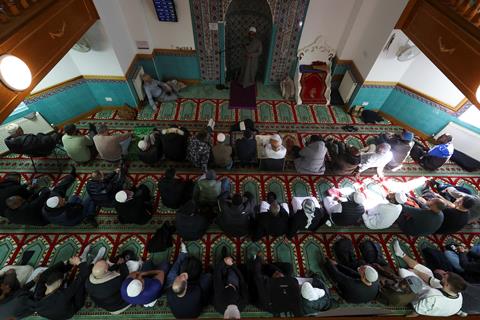The recent Unite the Kingdom rally highlighted growing concerns about Islam’s influence in Britain. Christian Concern’s Tim Dieppe looks at four distinct approaches Christians have taken and considers their strengths and weaknesses

I was very taken with Sir Trevor Phillips’ comment in The Times last week. He attended the Unite the Kingdom rally to see for himself what these people wanted, and this was his observation: “The overwhelming majority of the crowds waving flags and carrying crosses weren’t there for a fight. But they do have a cause. The angry protests outside asylum hotels are now metastasising into a simpler, broader message: stop immigration, defend free speech, revive Christianity. It is a compelling trinity for a country that feels angry and unmoored.”
Douglas Murray also noted in The Spectator “the prominence of overly Christian figures” on the main stage of the rally. Others I have spoken to who were there agreed that there was a lot more openness to the gospel in the crowds that day than they had seen elsewhere before.
All Christians would agree with defending free speech, and of course with reviving Christianity. Stopping immigration is an overly simplistic slogan, but it betrays widespread deep concerns about immigration being out of control in the country, and about the rise of Islam in particular.
The question of how Christians should respond to Islam has become an urgent, and important issue for churches to think through. Let’s assess the strengths and weaknesses of four approaches already advocated by many Christians.
1. Interfaith collaboration
Some Christians will naturally want to stress the scope for collaboration with Muslims. After all, we share belief in one God, and we share some moral values too. We should therefore, it is argued, befriend Muslims and find common ground around which we can unite and collaborate.
I think there is some limited scope for co-belligerence with Muslims on some issues – opposition to LGBT ideology being taught to young children in schools might be one. In any such collaboration, however, we need to be very clear that we have radically different beliefs on core issues. On LGBT education, for example, while we would agree that we don’t want young children indoctrinated with LGBT ideology, Christians would want education to promote monogamous marriage, whereas Muslims (if they follow Islamic doctrine) would want to teach that men can have up to four wives. This fundamental disagreement about what we really want limits the scope for co-belligerence.
The differences between Christian beliefs and Islamic beliefs are not just minor points of theology, they are core central tenets of our religions. Muslims do not accept that Jesus was divine, or even that he died on a cross. We do not even worship the same god. Any interfaith collaboration must not seek to minimise or overlook the crucial distinctiveness of the gospel. Witnessing to the uniqueness of the gospel ought to be part of any engagement or collaboration with Muslims.
2. Spiritual Warfare
This approach recognises first of all that Islam is a false religion which is deceiving many people and keeping them from responding to the gospel.
The rise of Islam in the UK is thus primarily a spiritual battle over the souls of individuals, and the soul of the nation. We therefore need to pray for our Muslim friends asking God to reveal himself to them and pray for the nation to uphold Christian values, such as free speech and freedom of religion, rather than adopting, for example a definition of ‘Islamophobia’ which will make it very difficult to criticise Islamic beliefs.
I am in complete agreement with this approach. This is a spiritual battle which will only be won with prayer. The only danger here is neglecting our responsibility to match prayer with action.
3. Evangelism
Some Christians see the immigration of Muslims to Britain as a fantastic evangelistic opportunity! It can be very difficult or even dangerous to be a missionary in many Islamic countries so it’s great that they are coming here where we can freely preach the gospel to them!
I love this heart for the lost and the missional motivation. Indeed, I co-wrote Questions to Ask Your Muslim Friends with Beth Peltola precisely because of this opportunity and in order to empower and equip Christians to have these gospel conversations. We do still have free speech in this country which means that we can freely preach that Muhammad is a false prophet and that Islam is a false religion.
The most effective evangelists to Muslims are often those who are prepared to be boldest in their proclamation of Christianity and in their denunciation of Islam. I have written before that since the gospel is offensive, we are unlikely to be preaching the gospel if we are never offending people.
Hatun Tash is the most effective evangelist to Muslims I know – she is also the most provocative. I don’t think that is a coincidence. Evangelism to Muslims requires courage and we urgently need more Christians to rise to this challenge. I do see some signs that this is starting to happen.
4. Confronting, Exposing and Resisting
Paul said that we should “demolish arguments and every pretension that sets itself up against the knowledge of God.” (2 Corinthians 10:5).
Islam is surely a pretension that sets itself up against the knowledge of God. Therefore, we are called to demolish its arguments.
Paul also said: “Have nothing to do with the fruitless deeds of darkness, but rather expose them.” (Ephesians 5:11). One response to the growth of Islam is to confront its truth claims and to expose the darkness of its teachings. This is important and necessary. While critiquing Islam in the strongest terms, we are not claiming that all, or even most nominal Muslims subscribe to all these beliefs.
Islam is intolerant, and discriminatory towards both women and non-Muslims. It is not a benign influence on our society. Its influence should therefore be resisted. For Christians this cannot include the use of violent force - not that any Christians are advocating this as far as I am aware. But some ‘fighting’ rhetoric can be dangerously prone to misunderstanding, so care is needed.
Be informed
All four of these approaches are valid and are important. For all of them, Christians need to be well-informed about the true nature of Islam.
Most churches have historically focussed on apologetics to atheists. There are many more Muslims in our society today than atheists though! We therefore need to start teaching Christians about Islam and using sermons to contrast Islam and Christianity at relevant points.
If you take one thing from this article, perhaps it should be to read something to become better informed about Islam for your own Christian ministry and witness.






































4 Readers' comments